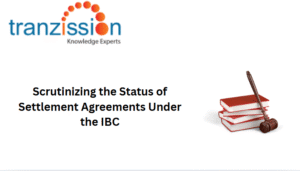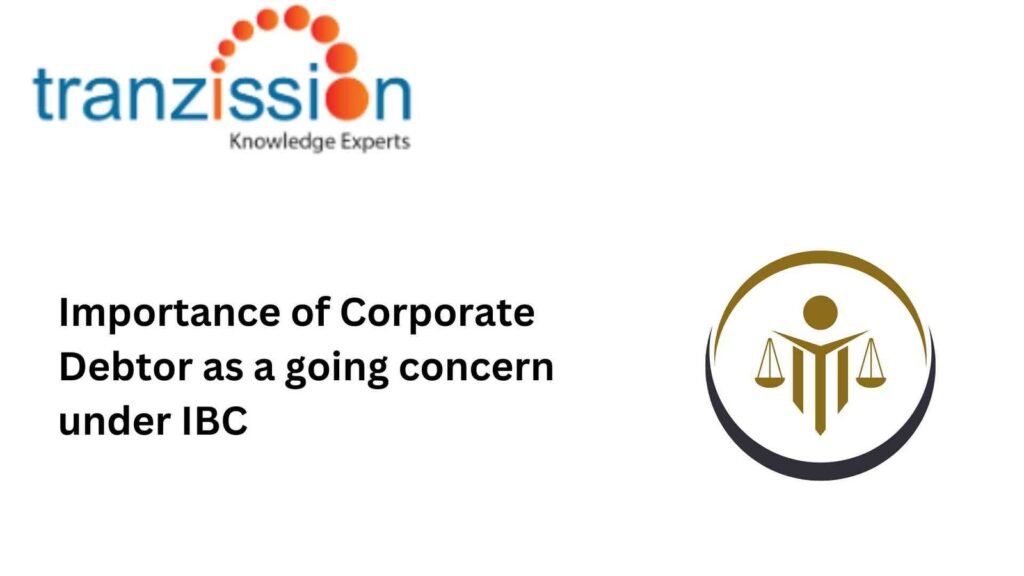
Importance of the Corporate Debtor as a going concern under IBC

Table of Contents
The Insolvency and Bankruptcy Code, 2016 was established to resolve the financial issues of the corporate debtor as a going concern. It is crucial to treat the corporate debtor as a viable business that can continue operating and be sold as a whole unit. But what is the need for continuing an insolvent company that may be resolved or liquidated as an outcome of insolvency proceedings?
What is a “Going Concern” Sale?
A “going concern” sale involves transferring the business as a functioning unit, retaining its value, employees, assets, and contracts. Under the Insolvency and Bankruptcy Code, 2016 (IBC), “as a going concern” means selling a business or a portion of it as a whole, rather than selling individual assets. The buyer takes over the business, including its assets, liabilities, employees, etc. The business operations of the company must continue even during insolvency proceedings. If the company survives as a going concern then there is no need to dissolve it immediately when it becomes insolvent.
Read more : Offences and Penalties under IBC, 2016
Significance for Insolvency Professionals
For an insolvency professional to continue a company as a “going concern” is crucial because it maximises the value of the company during the corporate insolvency resolution process (CIRP). This allows for a higher chance of successful resolution and better recovery for creditors by keeping the business operational and generating revenue. Insolvency professionals will also protect the employment and the business goodwill of the company.
Legislative Framework in India for Going Concern Sales
Going concern sales ensures the continuity and safeguard creditor interests. Section 20 of the IBC requires the interim resolution professional or resolution professional to manage the corporate debtor as a going concern. This includes protecting the corporate debtor’s property value, appointing professionals, and entering into contracts. The sale as a going concern is elaborated under Regulation 32A of the Insolvency and Bankruptcy Board of India (Liquidation Process) Regulations, 2016 (hereon forward known as “the Liquidation Process Regulations”)
Under Regulation 32 of the Liquidation Process Regulations allows a liquidator to sell a corporate debtor as a going concern, meaning that a liquidator can sell the entire company as an operational entity to a potential buyer who intends to continue running the business instead of liquidating the assets separately.
Amendments and Clarifications
Through Notification No. IBBI/2018-19/GN/REG037 dated 22nd October 2018 inserted Regulation 32, and under clause(e) the liquidator may sell the corporate debtor as a going concern. Notification No. IBBI/2019-20/GN/REG047 dated 25th July, 2019 inserted Regulation 32A to explain the term of “sale as a going concern”. Regulation 32A(5) states that if the liquidator is of the opinion that it is viable to run the corporate debtor as a going concern, he shall consult the consultation committee and only on its advice he shall run the affairs of the corporate debtor as a going concern to the extent approved.
Read more : Balancing environmental claims during CIRP
Importance of Going Concern Sales During Liquidation
Higher Value Realization:
Selling a company as a going concern generates a higher price than selling individual assets separately, as the buyer can benefit from the company’s intangible value like brand recognition, customer relations, and operational synergies. Therefore, selling a business as a functioning unit fetches a higher value compared to piecemeal liquidation.
Preservation of Business Goodwill:
Retaining the brand, reputation, and customer loyalty of the insolvent company helps in better valuation.
Protection of Employment:
Continuing the corporate debtor as a going concern prevents large-scale unemployment by retaining employees during the transition. Preserving goodwill can help maintain employee morale and productivity, as they are more likely to stay with the company that appears to have a future.
Challenges in Implementing Going Concern Sales
Valuation Complexities:
The going concern value is a value that assumes the company will remain in business indefinitely and continue to be profitable. The determination of the business’s worth as a going concern is more complex compared to the asset-based valuation, as the latter calculates the company’s value by summing up the fair market value of all its assets, essentially considering the company as a collection of parts rather than an operating business.
Legal and Regulatory Hurdles:
Aligning the process with legal frameworks and obtaining necessary approvals can delay the sale. There are innumerable legal and regulatory hurdles, such as delays caused by procedural complexities, court backlogs, and inefficiencies in the adjudication process.
Stakeholder Resistance:
There may be resistance from stakeholders regarding sale terms or disagreements among creditors may arise. This is a result of the lack of clarity and transparency which further leads to misinformation and conflicts. If the conflict is not managed properly, disagreements only escalate and affect the decision making process.
The Role of Liquidators in Going Concern Sales
Facilitating the Sale Process:
A liquidator helps the going concern sale process by facilitating the sale of the company’s business as a functioning entity, including all assets and liabilities, to a potential buyer. They must also identify the potential buyers and ensure transparent bidding processes.
Stakeholder Coordination:
Each stakeholder contributes to continuing the business operations during the insolvency or liquidation proceedings. Liquidators have an important role in engaging with creditors, employees, and buyers to ensure smooth execution.
Overcoming Challenges:
To avoid further legal and financial challenges, liquidators must address any valuation concerns and resolving stakeholder conflicts are key responsibilities.
Benefits for Insolvency Professionals and Aspirants
Insolvency professionals may gain practical insights into managing complex liquidation matters. It is important to master the topic of “going concern sales” to broaden their career prospects in insolvency practice. Insolvency professionals can benefit from understanding going-concern sales because it can help them maximise value for creditors and corporate debtors. Further, it can facilitate resolution and expedite the liquidation process.
Case Studies: Successful Going Concern Sales
The Essar Steel case saw a large-scale resolution, where the company was sold as a going concern. This allowed continued operations and preserved jobs while maximising returns for creditors. The NCLT highlighted the application of “liquidation as a going concern” under the IBC, where employee retention was prioritised by facilitating a sale to a buyer willing to continue operations in the Gujrat NRE Coke case. The Hon’ble Supreme Court in Sunil Kumar Jain & Ors. vs. Sundaresh Bhatt & Ors held that the interim resolution professionals or the resolution professional operate the corporate debtor as a going concern during CURO and that the workers who worked during this time, the salaries and wages of the corporate debtor’s employees can be included under CIRP cost.
Conclusion
“A corporate debtor as a going concern” signifies the concept of treating a company undergoing insolvency proceedings as a functioning business that should be preserved and revived, rather than immediately liquidated The “going concern” sales are a strategic approach to maximizing asset value and preserving business continuity during insolvency .or liquidation proceedings. Hence, the primary goal is to maximise the value of the company by allowing it to continue operations and potentially find a resolution plan that keeps the business running, benefitting creditors, employees, and the overall economy.





